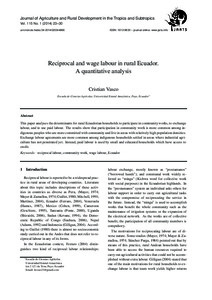Reciprocal and wage labour in rural Ecuador. A quantitative analysis
| dc.date.accessioned | 2014-08-25T10:09:43Z | |
| dc.date.available | 2014-08-25T10:09:43Z | |
| dc.date.issued | 2014 | |
| dc.identifier.issn | 1612-9830 | |
| dc.identifier.uri | urn:nbn:de:hebis:34-2014020344866 | |
| dc.identifier.uri | http://hdl.handle.net/123456789/2014020344866 | |
| dc.language.iso | eng | |
| dc.publisher | Kassel University Press | ger |
| dc.rights | Urheberrechtlich geschützt | |
| dc.rights.uri | https://rightsstatements.org/page/InC/1.0/ | |
| dc.subject | Reciprocal labour | eng |
| dc.subject | community work | eng |
| dc.subject | wage labour | eng |
| dc.subject | Ecuador | eng |
| dc.subject.ddc | 630 | |
| dc.title | Reciprocal and wage labour in rural Ecuador. A quantitative analysis | eng |
| dc.type | Aufsatz | |
| dcterms.abstract | This paper analyses the determinants for rural Ecuadorian households to participate in community works, to exchange labour, and to use paid labour. The results show that participation in community work is more common among indigenous peoples who are more committed with community and live in areas with relatively high population densities. Exchange labour agreements are more common among indigenous households settled in areas where industrial agriculture has not penetrated yet. Instead, paid labour is used by small and educated households which have access to credit. | eng |
| dcterms.accessRights | open access | |
| dcterms.bibliographicCitation | In: Journal of Agriculture and Rural Development in the Tropics and Subtropics. Kassel : Kassel University Press. - Vol. 115, No. 1 (2014), S. 23-30 | |
| dcterms.creator | Vasco, Cristian | |
| dc.description.everything | Gedruckte Ausg. im Verlag Kassel Univ. Press (www.upress.uni-kassel.de) erschienen. | ger |

